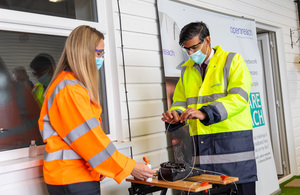Chancellor visits Openreach as government’s super-deduction supports creation of 7,000 new jobs and expansion of broadband rollout to rural homes
Thousands of jobs are being created thanks partly to the government’s super-deduction, the biggest two year tax cut in modern British history, the Chancellor heard today (28 May) on a visit to Openreach in Peterborough.

The Chancellor at Openreach in Peterborough
The super-deduction rewards companies that invest in new equipment or infrastructure by cutting their tax bill.
Openreach has announced it is accelerating plans to deliver Full Fibre broadband to the UK’s hardest to reach communities, creating thousands of jobs, thanks in part to support provided through the super- deduction.
The Chancellor of the Exchequer, Rishi Sunak, visited Openreach’s Training Centre in Peterborough today and met some of these new recruits.
Openreach are bringing direct fibre broadband to 25 million UK premises by 2026, while helping to create 7,000 new engineering jobs.
This will include delivering ultrafast, ultra-reliable broadband to more than 6 million premises in the UK’s hardest to reach areas. Recruitment by Openreach for 1,000 engineering jobs in 2021 is already underway.
During the visit, the Chancellor received a demonstration on safe working from Openreach apprentices, before touring its “open street” used for training engineers, where he was able to have a go at installing broadband himself.
Chancellor of the Exchequer Rishi Sunak said:
Announcements of new jobs like the 7,000 being created by Openreach show that our Plan for Jobs is working. As we re-open the economy we are providing incentives for businesses to invest and create jobs which is why we introduced the super- deduction - the biggest 2-year business tax cut in modern British history.
It was fantastic to meet some of Openreach’s new recruits today and hear how they are rolling out full fibre broadband to millions living in the hardest to reach communities.
With a £100 billion government investment in UK infrastructure this year, I’m confident that more businesses like Openreach will play their part in helping us level up by investing in all corners of the UK.
Openreach CEO, Clive Selley said:
All the research shows that nationwide Full Fibre broadband will deliver economic prosperity, higher employment and a boost to the UK’s international competitiveness. It’s also massively green.
Having said that, this is a hugely complex, nationwide engineering project – second only to HS2 in terms of investment - and it needs the full force of government and industry to get the job done. That’s why we welcome the Government’s support – particularly in the form of the super deduction and apprenticeship levy - as it’s helping us to build further, faster and create thousands more jobs as we go.
Digital Secretary Oliver Dowden said:
We are levelling up the UK and taking hard-to-reach homes and businesses off buffer mode with a £5 billion investment in lightning-fast, next generation broadband.
I welcome Openreach’s ambitious plans to connect millions more rural homes to gigabit speeds. It means our funding can go even further to help those in need and will create thousands more high-skilled engineering jobs as we build back better from the pandemic.
Further information
-
Announced by the Chancellor at Budget in March 2021, the super -deduction allows businesses to claim a 130% capital allowances on any qualifying plant and machinery investments that they choose to invest in. According to the independent Office for Budget Responsibility, this will help boost business investment by 10% - around £20 billion more per year
-
As part of its programme, Openreach will roll out full fibre optic broadband in over 1,000 UK locations including market and coastal towns, villages and hamlets – from Kirkwall in the Orkney Islands and Cardigan in Wales, to Keswick in Cumbria and Allhallows in Kent
-
Spending Review 2020 committed £100 billion of capital investment in 2021-22, a £30 billion cash increase compared to 2019-20, with record levels of investment for the railways, strategic roads, broadband networks and flood defences. This was underpinned by the UK National Infrastructure Strategy
-
The National Infrastructure Strategy in November 2020 outlined how the Government is working with industry to target a minimum of 85% gigabit-capable coverage by 2025, while seeking to accelerate rollout further to get as close to 100% as possible